There has been recent news in Germany of calls to ban employees from using social networking sites to discriminate new employees.
Although the attempt to legislate against employees using Facebook appears a little extreme, it represents an increasing and concerning trend.
What is happening in Germany, is an attempt to make this gray area strictly black and white.
By default, Facebook makes aspects of your profile open to users, allowing people to see your pictures and information. If you have nothing to hide, this won't affect your professional life. But there is always the threat that a friend will write an incriminating wallpost, or tag yourself in an unflattering photo or video.
Of course, the obvious thing to do would be to make your profile private.This might help the individual in the hiring process, but what about after you have been hired? But what if your colleague or employer adds you as a friend? A refusal to accept a request could cause an uncomfortable workplace, and cause as large a professional threat as that embarrassing photo.
I have had an employee tell me that he checks all candidates online, although I'm unaware of how thorough these checks were. For the employee, these checks were necessary for the credibility of the company. Furthermore, the job involved working closely with young children, and any trouble or ineptitude caused by employees would reflect poorly upon the company.
Fortunately, at the time I didn't have an online social networking profile. If this were to happen now, I think I would view it as an invasion of privacy, especially as an online profile wouldn't reflect my abilities. I'm troubled by the thought of strangers looking through your photos, already anticipating finding something negative. At the same time, I understand the position of employers, especially with children involved.
Although I'm still undecided on the issue, on this gray area, I'm leaning towards the side of privacy. Although it may seem a little naive and hopeful, I hope that similar action to Germany won't be required in other countries, but that employees will refrain from using Facebook to monitor employees, and if they do, that information they receive will be put in perspective. In the meantime, maybe don't tell the world you hate your boss.








